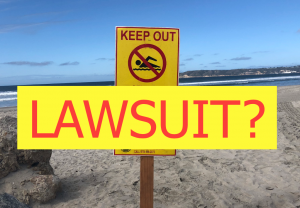Submitted by Carolyn F. Rogerson
During the February 19, 2019 Coronado City Council meeting, an update was provided on our local efforts to address the ongoing sewage spills coming from Mexico. Several public speakers, many from Imperial Beach, implored the City Council to join the City of Imperial Beach’s lawsuit against the federal government. Why? Other than “symbolism” and “strength in numbers,” none of the public speakers had an answer.

Rather than suing the federal government, Coronado decided back in 2017 to engage in a diplomatic strategy. According to Coronado’s legal representative on this issue, Imperial Beach’s lawsuit will proceed regardless if Coronado joins, and, neither the merits of the case nor likelihood of success will change with our participation. Furthermore, the representative said joining the lawsuit risks the strong possibility of cutting-off or muffling the ongoing discussions between Coronado and the federal government. After all, once lawyers are involved you’ve created a legal adversary rather than a partner with shared goals.
In other words, joining the lawsuit would simply be a feel-good decision with zero upside and potentially big downsides for the City of Coronado. But I suspect an unspoken reason Coronado will not join Imperial Beach’s lawsuit is that it lacks merit and our city council believes it would be a waste of tax dollars. The State of California, City of San Diego, County of San Diego and City of Coronado all decided against joining Imperial Beach’s lawsuit. Why would these agencies decide independently to pursue other strategies if the original lawsuit had merit?
My thoughts are that Coronado’s multi-pronged approach to resolving this decades-old issue should be lauded because it appears to be working. According to Coronado’s legal representative, even if just one of the lawsuits is successful, Congressional action will likely be needed to appropriate funds to remedy the situation. While everyone else waits for the Imperial Beach’s first hearing date of April 13, 2020, Coronado is lobbying the federal government now. Over the past twelve months, since Coronado began lobbying, Congress has increased funding that can only be used for environmental projects along the border from nearly $0 to $25 million. While this is not enough to finish all of the necessary projects, it is a start.
Perhaps Coronado officials’ efforts have proven more valuable in creating interest in the Tijuana River raw sewage and toxic chemical crisis, and has helped produce more immediate results, than this lawsuit. Why do activists believe Coronado must rush to join a lawsuit, which won’t be heard for over a year?
I added my comments at last week’s City Council meeting by requesting those who insist joining the lawsuit is a worthwhile pursuit, provide the following information: 1) Name the law firms and attorneys secured to litigate the lawsuit, 2) Provide information regarding legal fees, those already paid, any fees due, and name any other companies and individuals, such as consultants, who have been hired, 3) What results have the attorneys produced, besides securing a court hearing date set for 2020? 4) Where will this case be heard? Although I have asked, no one pushing litigation has clear answers.
Daron Case routinely denigrates our Mayor and City Council regarding our approach to finally resolve the cross-border pollution crisis.
In his 2/21/19 letter, Daron Case stated, “IB has incurred substantial legal fees and spent approximately $250,000 lobbying south of the border.” It is interesting that Daron cheers Imperial Beach lobbying Mexico and suing our federal government even though the root of the problem belongs in Mexico. I fear spending such large sums lobbying Mexican officials in Mexico or paying private American attorneys to sue the federal government would be tax dollars flushed away.
I appreciate that Daron used my “multi-pronged” analogy in his recent letter. I can safely say that by using the diplomatic approach in the United States and in Mexico, meeting with stakeholders and residents, and publicly reporting on the results, Coronado has met four or the five prongs to which Daron referred. The litigation prong that Daron vigorously endorses is far too weak, lacks transparency, and, even if successful, will still require Congressional funding.
The entire Coronado City Council, including former Councilmember Carrie Ann Downey, have been engaged in this issue like no previous council, and they have always been unanimous in their decision to pursue a diplomatic approach. I applaud these efforts to solve a serious health crisis that has gone unaddressed for far too long.
Submitted by Carolyn F. Rogerson




